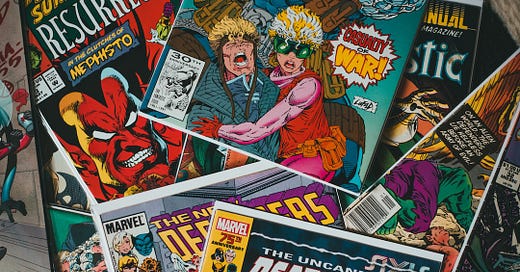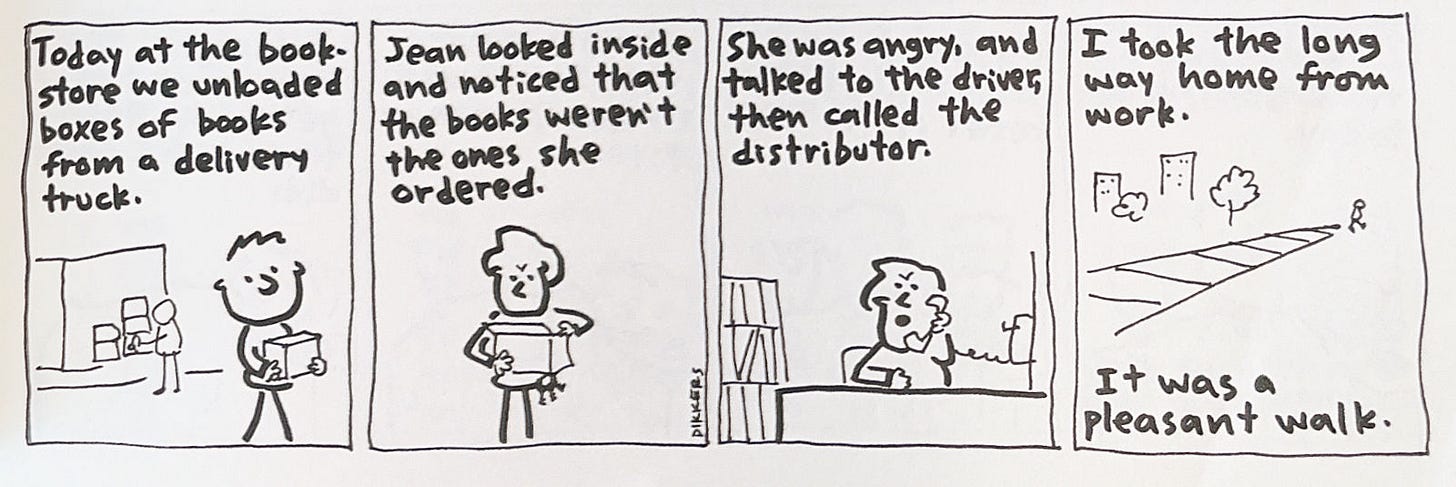With job hunting, attitude is everything.
Which leads to the tale of two comic strips.
“Dilbert” is a comic strip that dominated the 90s with its sardonic take on corporate culture. When I was working in the corporate offices of Lands’ End back in those same 90s, I suddenly “got” Dilbert because of the nonsense I dealt with there. The strip was the poster child for real stories like how a company bought laptops for all its employees, but then bolted the laptops to their desks.
Here’s an example of the strip in case it’s been a while since you’ve seen it:
“Jim’s Journal” is a comic strip that began almost the exact same year as Dilbert. It started as the zen-like musings of a college student with a low-stakes life, and followed up as Jim got a series of low-stakes jobs - at a bookstore and a copy place, for example. The after-college book collection was called “I Got A Job - And It Wasn’t That Bad.”
Here’s an example of Jim’s Journal style:
If you’ve never heard of “Jim’s Journal,” I would highly recommend seeking it out, either online or in one of the compilations. It’s sweet and light and sneakily funny in its own way.
Both of these comic strips deal with the world of work, if not specifically job hunting. So what can we learn from the contrast between these comics?
Sarcasm is overrated, and can do long-term damage if you lean into it. It’s easy to fall into Dilbert-like rage about the state of things. But that doesn’t help you. Jim takes a warm bath, and he’s ready to face the next day.
Most things are less important than we make them out to be. Dilbert lives in a constant state of frustration at bosses and co-workers. Jim casually fills out a job application for a job at a copy place, and they tell him he can start tomorrow.
Humor gets us through. But the type of humor we indulge in makes a huge difference. Garbage in, garbage out. When you read a Dilbert cartoon, you might laugh, but you also tense up. When you read a Jim’s Journal cartoon, it’s like putting on your most comfortable sweater.
Mental health is crucial and needs tending. Again, Dilbert is often in a rage, and feels powerless to change anything. Jim faces problems at work, then goes home and pets his cat, Mr. Peterson. Jim’s problems are low-stakes, but he knows that.
The media we consume matters. “The wolf that wins is the one you feed.” This is all the more important when you are going through something stressful like job hunting. You need to surround yourself with media that feeds you, not drains you.
A tale of two Scotts
Just to emphasize the contrast between these two comics, it’s instructive to look at their creators, both named Scott. Scott Dikkers, creator of Jim’s Journal, was the Editor-in-Chief of The Onion, and hosts a podcast called How to Write Funny. Scott Adams, creator of Dilbert, is a human garbage fire misogynist and racist whose syndication was eviscerated after he went on a public rant against black people.
Be more like Dikkers, not Adams.
Thanks for being here. I hope this newsletter is something that feeds and supports you. See you next week.
Hearing from you
What media helps you stay centered in times of stress?







Weird, I've been thinking about this kind of mindset — in terms of both who I'm hanging out with and what my own frame of mind is. There's so much truth to that reminder to feed the right wolf. I'm feeling so much anger and frustration with the world now that I have to keep reminding myself to lead with love. And I love your illustration of this with the two comic strips! Sarcasm can be fun, but it's best kept to small doses. Dilbert resonated with people because it brought to light so many real experiences, and that's useful — to help people realize that 1) they're not alone and 2) the situation they're in is not normal or right. But then, what do you do with that? Stew in that feeling and keep reading more Dilbert, or find a way to get out of/improve the situation?